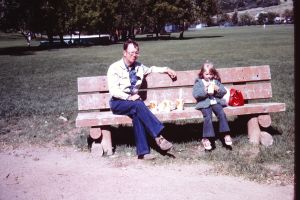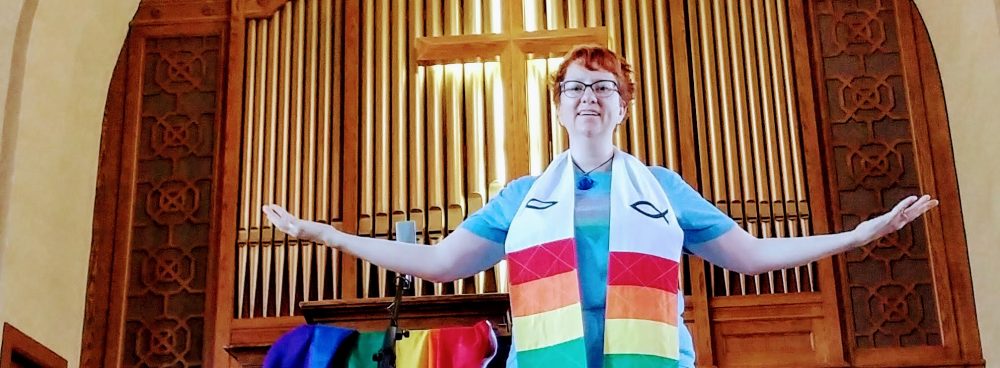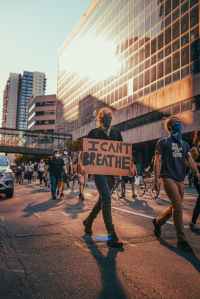When I looked at the scripture readings for this week that were part of the lectionary, I didn’t want to read or talk about any of them. The Hebrew scripture reading tells the story of Hagar and her son Ishmael being forced to leave the community and wander in the desert until they are about to die of thirst.
The second reading from the Hebrew scriptures has Jeremiah crying violence and destruction and praying that God will come and destroy all his enemies.
The psalm readings continue this theme and the reading from Romans was all about sin and death. Then there’s the reading from Matthew 10:24-39. None of these readings seem very uplifting or inspiring. I wasn’t going to use any of them, but I was in a meeting early in the week with some other diaconal folk and someone shared a prayer/ reflection that they had written about the scripture we just heard. It forced me to go back and relook at this passage.
This passage is very challenging and when I read it initially, I felt overwhelmed. I had trouble forcing my tired and muddled brain to really read and hear the words. The passage is full of paradoxes. It contains things that sound like good news and then follows it up with death and destruction.
Jesus has just commissioned his disciples to go out into the world—healing and teaching. This reading is part of his advice and instructions to them. It shows God’s deep and abiding love for us and then tells us that if we are not faithful, we are unworthy and unloved.
I imagine the response of one of the disciples:
Jesus sent us out yesterday. It is strange not having him right beside us. He sent us on a mission: “Cure the sick, raise the dead, cleanse the lepers, cast out demons.” I feel totally unprepared for what he is asking me to do. I watched Jesus cure a couple people, but I don’t know exactly how he did it. I heard that he raised some people from the dead, but I wasn’t actually there when it happened. I don’t want to touch the lepers and get infected myself. And well demons? That’s another whole kettle of fish.
We aren’t supposed to take anything with us but rely entirely on the generosity of others. I don’t like the idea of trusting that I’ll have a safe place to sleep each night and that food will magically appear in front of me. That’s not how our society works. Why does Jesus think we can just ignore the social norms of paying for an inn and food? Why does he think we should rely entirely on the hospitality of strangers?
I’m really uncomfortable with this mission. Jesus told us we should be like him, our teacher, but not him. I can’t do everything he does anyway so I can’t be like him. He told us not to be afraid. He said all the secrets would be revealed. What secrets? My secrets? There are lots of things I don’t want the whole world to know…. Is that what Jesus is talking about? Or is he talking about what he already told us? Is what he’s been telling us a secret and now it’s about to be revealed to the world?
It got even more disturbing. Jesus told us not to be afraid of being killed. What? This is more dangerous than I thought. I figured I’d just be walking around, and people would bring their sick to me. I’d heal them somehow, even though I feel completely inadequate for the task. Then he announces there’s a good chance I might be killed but not to worry about it. Aaauk. I’m supposed to worry more about the people who will kill my soul. Is that even a thing? Can someone kill my soul? That’s the essence of God. How can someone kill the essence of God?
There was one good moment. As he was getting ready to send us out, he reminded us how much we are loved. More than the sparrows. God has counted the hairs on our heads. That moment was so comforting. I felt surrounded by a warm blanket and held. I could almost sense God’s presence.
And then it was gone again. Jesus started talking about judgement and about how if we don’t do this thing for him if we don’t go on this mission, he will deny us access to God. He told us that by following him, we will inevitably end up in conflict with our families. Family is everything. I don’t want to tear my family apart or be estranged from them. How can he ask this of me?
I thought hanging out with Jesus would bring peace and calm to my life. Instead, it has brought turmoil and uncertainty. If we don’t follow and do what he asks, he says we are unworthy of him and presumably of God. He said that in order to find the life we have to give up life.
I’m so tired of the riddles. I’m tired of trying to figure out what Jesus wants from me. What he is asking is too hard. It’s too much and I don’t want to do it.
I really struggled with this passage because it bounces between a sense of God’s compassion and God’s judgement. I hate the idea that God finds us unworthy. We are human. We are not meant to be Jesus or God. We are not always going to be able to be faithful. We try our hardest and still make mistakes. None of this makes us unworthy. It makes us human.
Sometimes, being faithful, being true to who we are creates conflict in families. I don’t think it was Jesus’ intention to create this conflict. Sometimes, being true to God, being true to who we are meant to be, leads us to places where our own values and our family’s values come into conflict. That type of conflict can be heart-wrenching and soul-destroying.
Being Father’s Day, I invite you to think about your own parents and families. Families respond to conflict in different ways. If this conversation brings up challenges for you that you feel you want to talk about, please be in touch with me during the coming week.
I invite you to think for a few moments about your own family. Have there been moments when someone being true to themselves or true to their faith created conflict? Were you able to resolve the conflict and rebuild the relationship or was there an estrangement?
Some families are able to navigate conflict with compassion. They might not agree on everything, but they still love and support each other. Some families avoid certain things because they know it will lead to conflict. Still others are quite prepared to have full-blown conflict on a regular basis. Some families push people out because they are unable to hold the tension of difference.
Jesus is calling us to a life of faithfulness. It isn’t always easy and sometimes puts us in conflict with people we love and care about. Faithfulness has two sides to it. Part of faithfulness is knowing how we are being called to live and being faithful to that. This requires strength when we know it might lead to conflict. The other side of being faithful means living with love and compassion even in conflict. It can be challenging to hold fast to our convictions about God within us and hold compassion for those we disagree with.
 My prayer for families, this Father’s Day, is that families will navigate the messiness of life with compassion and love for each other. I pray that families will find ways of supporting and nurturing each other even when they disagree. I pray that families will be places of safety. I pray that parents will create an environment in which children know they are loved, accepted and worthy no matter what. I pray that in families where there has been conflict and estrangement people will find ways of healing and letting go of the pain caused by broken relationships. May families learn and grow in faith together, always with a heart of love and compassion. Amen.
My prayer for families, this Father’s Day, is that families will navigate the messiness of life with compassion and love for each other. I pray that families will find ways of supporting and nurturing each other even when they disagree. I pray that families will be places of safety. I pray that parents will create an environment in which children know they are loved, accepted and worthy no matter what. I pray that in families where there has been conflict and estrangement people will find ways of healing and letting go of the pain caused by broken relationships. May families learn and grow in faith together, always with a heart of love and compassion. Amen.

 The laughter yoga that I use in worship relies heavily on the work of
The laughter yoga that I use in worship relies heavily on the work of 
 We closed our prayer time with laughter blessings. I invited people to turn on their gallery view on zoom or to imagine all the people they would see if they were at church. We put our hands out in front of us, looked at all the pictures and offered laughter blessings to those we could see and those we could imagine.
We closed our prayer time with laughter blessings. I invited people to turn on their gallery view on zoom or to imagine all the people they would see if they were at church. We put our hands out in front of us, looked at all the pictures and offered laughter blessings to those we could see and those we could imagine.